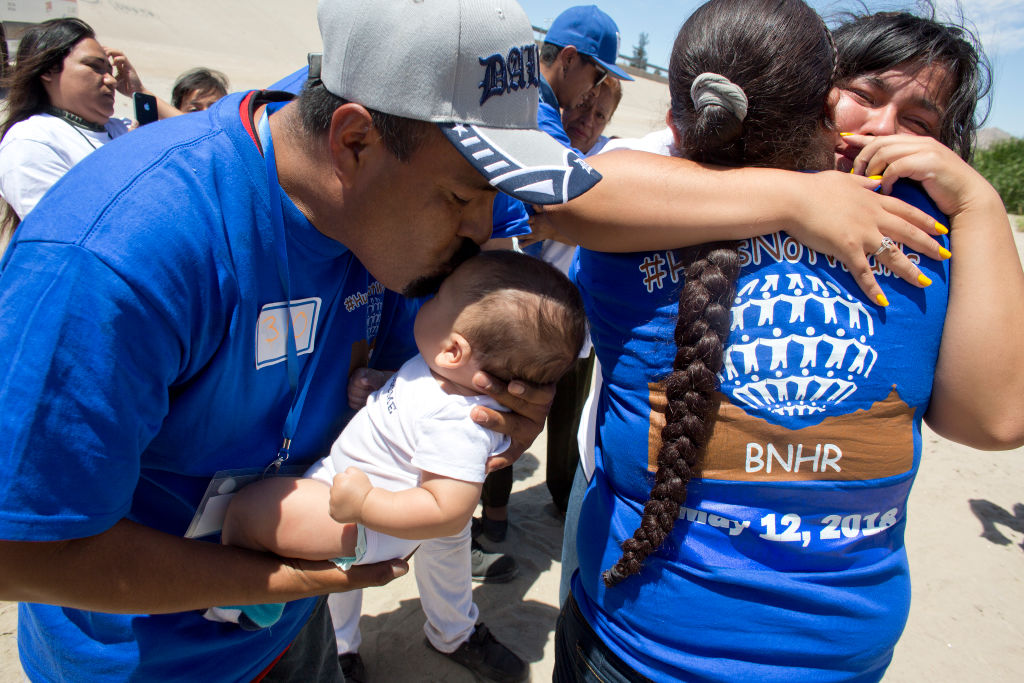The Society for Research in Child Development (SRCD) responded to the separation of children from their parents at the U.S. border with the following letter to Congress, co-authored by UConn’s Linda Halgunseth. Halgunseth is an associate professor of human development and family studies, and chair of the SRCD Latino Caucus.
An editor’s note was appended after the breaking news that the practice of separating families will be halted. “We at SRCD are relieved at this overdue change in policy. Yet, clear evidence indicates that trauma of separation during the highly stressful circumstances the affected children have experienced can have lasting effects.”
After the United States Department of Justice announced the “Zero Tolerance Policy for Criminal Illegal Entry,” Immigration and Custom Enforcement (ICE – an arm of the Department of Homeland Security) separated approximately 2,000 children from their parents in April and May 2018 as they approached the U.S. border. Children and parents were placed in separate facilities as they were being processed, and were not told when or how they would be reunited. This policy and its consequences have raised significant concerns among researchers, child welfare advocates, policy makers, and the public, given the overwhelming scientific evidence that separation between children and parents, except in cases where there is evidence of maltreatment, is harmful to the development of children, families, and communities. Family separations occurring in the presence of other stressors, such as detention or natural disaster, only adds to their negative effects.
Evidence on Harmful Effects of Parent-Child Separation
The evidence that family separation is harmful dates back to studies on the effects of parent-child separations on children’s well-being during World War II. This research documented far-reaching effects of these separations into adulthood, including increased risk for mental health problems, poor social functioning, insecure attachment, disrupted stress reactivity, and mortality. Other research similarly documents the harmful effects of parental separation on child well-being in a variety of other child populations, including children in Romanian orphanages, children in foster care, and children of incarcerated parents. More recent work has documented the increased mental health risk faced by both parents and children when they are separated in the immigration process. Parent-child separation has long-term effects on child well-being, even if there is subsequent reunification. After being separated, reunited children can experience difficulty with emotional attachment to their parents, self-esteem, and physical and psychological health. For some children, time does not appear to fully heal these psychological wounds.
Parents Buffer Children from Adverse Effects of Toxic Stress
Parental separation is considered a toxic stressor, an experience that engages strong and prolonged activation of the body’s stress-management system. The physiological and psychological toll of early life stress, including parental separation, changes how the body responds to stress in the long term, disrupting higher-order cognitive and affective processes as well as negatively altering brain structures and functioning. Such stressors put children at greater risk for a multitude of health and psychological impairments, including anxiety, depression, post-traumatic stress disorder, lower IQ, obesity, immune system functioning, physical growth, cancer, heart and lung disease, stroke, and morbidity.
Children depend on their primary caretakers to successfully navigate stressful and traumatic events. Children’s physiological responses to stress can be significantly reduced by access to their primary caretaker. The separation of the family unit under extreme conditions of stress worsens the psychological and physiological ramifications of that stressor on children, especially younger children. Conversely, ongoing contact with primary caregivers under conditions of stress can protect against risk.
Child-Separation from Parents Impacts Children at All Ages
Much of the research on family separation has focused on the impacts on children early in development. However, puberty is also an especially vulnerable time of rapid change. Stressors during adolescence can have lasting impacts — the effects of which may not become evident until adulthood. Further, the effects of traumatic experiences are cumulative; children and adolescents who have already faced previous adversity are particularly susceptible to long-term further negative consequences. Thus, the research shows that across infancy, childhood, and adolescence, child-family separations can be related to negative outcomes across the lifespan.
Impact of Border Family Separations on U.S. Citizens
There is also evidence that family separations harm U.S. citizens whose family members experience border detention or deportation. Parental separation increases the risk for these U.S. children’s mental health problems such as anxiety, depression, behavior problems, and symptoms of post-traumatic stress disorder. U.S. citizens of Latino descent also report heightened worries and concerns for their families and their communities as a result of changes in implementation of immigration policies such as the Deferred Action for Childhood Arrivals (DACA) policy. Moreover, countries with supportive integration policies are more likely to have child populations with better overall health and mental health indicators than those with less supportive approaches. Thus, there is evidence that policies about parental separations can negatively affect American citizens.
The Policy Implications are Clear
The scientific evidence is conclusive. Parent-child separations lead to a host of long-term psychological, social, and health problems that are not necessarily resolved upon reunification. In particular, the disruption of biological stress regulation mechanisms in the body induced by the need to seek refugee or asylum status are further taxed by the absence of parental support. The science is clear: policies that separate immigrant families upon entry to the U.S. have devastating and long-term developmental consequences for children and their families.



